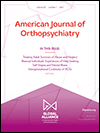IBCCES is the global leader in training and certification for healthcare professionals, educators and corporate partners who work with individuals with autism and other cognitive disorders. Our reach extends to more than 2 million people in all 50 states and over 70 countries around the globe. IBCCES Member Learning Community is provided as a free service to all IBCCES members who have completed one or more of our training and certification programs.
Experiences of discrimination among young adults experiencing homelessness: Relationship to mental health outcomes.
 This post was originally published on this site
This post was originally published on this siteYoung adults experiencing homelessness (YAEH) are at high risk for discrimination. Limited research has documented the extent of discrimination experiences and their relationship to mental health outcomes among this group. This study used data from YAEH who completed self-administered surveys across seven U.S. cities (N = 1,426) to examine the rates and correlates of discrimination experiences and their association with psychological distress and suicidal ideation. Chi-square and multivariate logistic regressions were used to examine the relations between perceived discrimination and race, gender identity, sexual orientation, foster care history, criminal justice history, reasons for homelessness, and length of time homeless. Then, logistic regression was used to examine whether discrimination increased the odds of psychological distress and suicidal ideation, controlling for other factors. Three-fourths (75.8%) of the sample (n = 1,055) reported experiencing at least one of the five forms of everyday discrimination experiences at least a few times a year, with the most common reason attributed to their housing situation (46%). Sexual orientation, juvenile justice involvement, and having been homeless for 2 years or more were associated with increased odds of experiencing discrimination. Discrimination was a strong predictor of psychological distress but was significant only at the bivariate level for suicidal ideation. Study results suggest that experiences of discrimination are common among YAEH and that these experiences increase risk for psychological distress. Providers working with YAEH need to validate and acknowledge the impact of these experiences on mental health. And, communities need to work to reduce discrimination experiences by targeting stigma against YAEH. (PsycInfo Database Record (c) 2022 APA, all rights reserved)